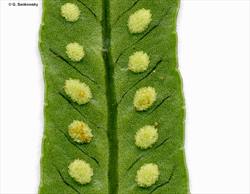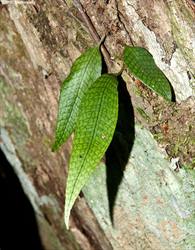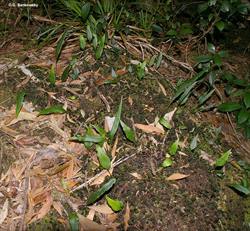Polypodiaceae
Australian Tropical Ferns and Lycophytes - Online edition
Selliguea simplicissima





Selliguea simplicissima (F.Muell.) Hovenkamp
Link to Australian Plant Name Index for publication details and synonyms: https://id.biodiversity.org.au/name/apni/225416
Rhizome long-creeping; densely scaly, scales non-clathrate, 1.5–6 mm long, 0.7–2 mm wide, ±spreading, ginger in colour, c. 3 mm long, with broadly rounded bases and attenuate acute apices; margins irregularly and minutely dentate or ±entire. Fronds ± dimorphic. Stipes spaced along the rhizome, articulated to short phyllopodia, 0.4–9 cm long. Lamina simple, varying considerably in size and shape. Sterile lamina ±ovate, 1–14.5 cm long, 0.6–2.8 cm wide; base narrowly cuneate (occasionally more broadly cuneate and somewhat rounded); margins almost entire to crenate in addition to being minutely incised; apex long, narrow, acuminate. Fertile lamina linear to linear-ovate, tapering gradually to the base and apex, 3.5–25 cm long, 0.5–1.5 cm wide, occasionally similar in size and shape to sterile fronds; main lateral veins usually obvious; other veins usually ±hidden in the substance of the frond. Sori in 1 row on each side of the midrib between adjacent main lateral veins, scarcely impressed into the laminal surface. Spores 62.5–82.5 µm long, 35–62.5 µm wide.
Endemic to NE QLD between Mt Finnegan and Mt Elliot.
Epiphytic or lithophytic in mesic low to upper montane vine forest and wet sclerophyll forest.
A single plant may have several different frond shapes depending on environment.
Slow to establish but may be cultivated in a hanging pot of coarse organic material or on a slab in a moist tropical garden or fernery.
Field AR, Quinn CJ, Zich FA (2022) Australian Tropical Ferns and Lycophytes. apps.lucidcentral.org/fern/text/intro/index.htm (accessed online INSERT DATE).
Field AR, Quinn CJ, Zich FA (2022) ‘Platycerium superbum’, in Australian Tropical Ferns and Lycophytes. apps.lucidcentral.org/fern/text/entities/platycerium_superbum.htm (accessed online INSERT DATE).







